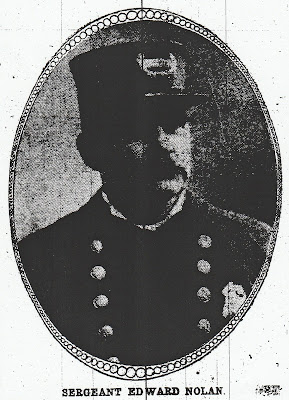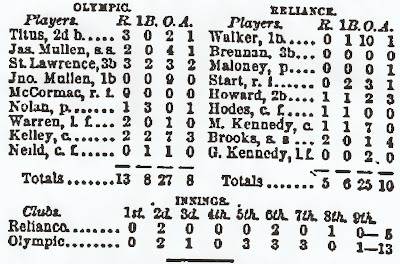Morning Call - May 19, 1913
Throughout its almost decade long existence, the Eureka Base Ball Club of Newark played some tough, competitive matches with the Brooklyn Atlantics, but on only one occasion, in 1866, did New Jersey's premier pre-professional club emerge triumphant. For that one game, at least, the Eureka were clearly the better team, routing the Atlantics 36-10, most likely taking out some of the frustration from two heart breaking one run losses a year earlier. Surprisingly, although the game was very one sided, reportedly three members of the Newark team's first nine were absent because they were "detained by business." That illustrates one of the realities of the period, even at the higher levels of competition - who showed up was both important and uncertain. As I've noted before, it's at least one aspect of 19th century base ball that is repeated in the vintage game, player attendance can vary from game to game and makes a huge difference. The Flemington Neshanock gave that reality a new twist on Sunday when six of the eight players who made their way to Goffle Brook Park in Hawthorne were over 50 years of age. It's safe to say that never happened in the 1860's.
Photo by Mark Granieri
Age brings certain benefits in experience (or at least I hope it does), but speed, athleticism and a half a dozen or so other things tend to suffer. Such was the case today when the Neshanock took on the Gotham Club of New York City, far too good a team to play at such a disadvantage. To their credit, Flemington kept both games close, but the Gothams ultimately broke both contests open for relatively easy wins. In the first match, the Neshanock were down only 7-5 after six innings, but the Gothams tallied three times in both the eighth and nine innings for a a 14-5 victory. One of the bright spots for Flemington was the return of Bob "Melky" Ritter who after working four innings last weekend, pitched both games today just about a year or so after a double hip replacement. "Melky" also contributed three hits, leading the offense along with Dave "Illinois" Harris also with three and Ken "Tumbles" Mandel with two. Unfortunately Flemington left 12 men on base including runners on third with less than two out in two consecutive innings, hardly the way to beat a team like the Gothams. The second contest was basically a mirror of the first with the Gotham prevailing by a 10-4 count in a game shortened by mutual agreement to seven innings. Flemington had fewer opportunities to score in the second contest, but did get two hits apiece from "Melky," Tom "Thumbs" Hoepfner and Mark "Gaslight" Granieri. With the twin losses, Flemington is now 6-2 on the season, heading into its annual Memorial Day visit to Newtown, Pennsylvania to take on the Newtown Strakes.
Driving to the matches in Hawthorne takes one through Paterson, which looks even more different today than one might expect from the city depicted on the above map. Most of 19th century Paterson was destroyed by the great fire of 1902, one of the worst urban conflagrations in American history, with property damage reported at $6 million including City Hall, the library and its 37,000 volumes and most of the business district. Working as a policeman at the time of the fire, was former major league pitcher, Edward "The Only" Nolan who played for the Olympic Club of Paterson before turning professional. As noted in an earlier post, the re-creation of the Olympic Club in 1874 coincided with Nolan's emergence as a more than above average base ball talent. An injury to the club's original pitcher, gave the young player an opening and he never looked back, working as the club's primary pitcher for almost every other game that season. It was also Nolan's first experience with public scrutiny including an unexplained story of temporarily leaving the club and then returning.
Photo by Mark Granieri
Nolan's ability was such that it was only a question of time before he moved on to a bigger stage, but the fortuitous timing of being part of the Olympic team just as that club again became prominent in New Jersey base ball circles, at the very least, facilitated his progress. If Nolan thought his 1874 performances had been forgotten, he was quickly disabused of that notion on April 30, 1875 when a crowd reported at 500 gathered to watch not the season opener, but merely a practice game featuring his pitching. The crowd apparently got what they wanted as the Paterson Daily Press reported the crowd "manifested considerable enthusiasm" at Nolan's superb pitching, especially now that he had "adopted the underhanded style declared to be indispensable." Not surprisingly considering the club's record the prior year, the 1875 version of the Olympics got off to a quick start winning their first six games in May behind Nolan's pitching.
Photo by Mark Granieri
However, the Olympics didn't fare quite so well on the scoreboard over the next six weeks, but that was due in large measure to a significant upgrade in the quality of their opponents. Paterson's proximity to New York City also aided Nolan's development as it gave him the opportunity to pitch against professional clubs, specifically three teams from the National Association. Then in its fifth and final season, the National Association was the country's first "national" professional league although its records are not recognized by Major League Baseball. Since it was a relatively short trip from New York to Paterson, three different Association clubs visited the city for exhibition games against the Olympics. None of the three were anywhere near the top of the lopsided National Association with two, the Atlantics of Brooklyn and the New Haven Elm City's failing to finish the season. The Atlantics were such a shadow of their formal selves that the club could manage only two wins in their league schedule against a mind boggling 42 losses with the New Haven Club not a whole lot better at 7-40.
Long time major league pitcher, Patersonian Jim McCormick
In spite of the abysmal records,however, these were still professional clubs, who played at a much higher level than anything Nolan had ever experienced. It was probably a surprise, therefore, to the Brooklyn club when they managed only three hits and one unearned run against the young Paterson pitcher which proved to be enough since the Olympics were unable to score. About a month later on July 2nd, the third Association club, the New York Mutuals arrived in Paterson reportedly short handed especially with the absence of first baseman Joe Start. Although not a first division Association club, the Mutuals had a far better overall record than the other two, admittedly something not that difficult to achieve. The Mutuals were apparently accompanied by a reporter from the New York Clipper, most likely not Henry Chadwick since he described Paterson as being "noted for locomotives, silk and factory girls," (if it was the Father of Base Ball, then for shame). Once again the professionals won, but were limited to five runs by Nolan, only one of which was earned. The writer did criticize Nolan for copying Bobby Matthews, the Mutuals pitcher in "wasting the first ball by throwing it over the striker's head," which shows the teenage pitcher was paying attention. In the end the Mutuals supposedly "congratulated themselves on winning by a score of 5 to 2."
Bobby Matthews - pitched for the New York Mutuals against Nolan, July 2, 1875
The loss was actually the second in two days as the prior day had seen the Olympics fall to the Trenton Club by an 8-2 count where the Paterson Daily Guardian, claimed the game would have been a rout were not for "Nolan's swift pitching." If they didn't already know it, the game introduced Nolan and his teammates to the reality that there were some fine amateur clubs in New Jersey. A decision by the club's leaders to play a state wide schedule also introduced Nolan and his teammates to the challenges of playing on the road. Previously away matches had been close enough to be made in one day, albeit long days, but in August the club ventured to the state capital in Trenton as well as far south as Burlington. On August 7th, in a game against Trenton, Nolan learned something about adversity. For the first six innings, the young pitcher had shut out what was supposedly a strong Trenton team with the Olympics leading 3-0 going to the top of the seventh. With one out, two dropped third strikes prolonged the inning and according to the Daily Press Nolan "suddenly seemed to be affected by the heat and to give out" allowing 17 runs over the next three innings (abetted by four errors) for an embarrassing 17-3 defeat.
Hall of Famer and one time Olympic of Paterson - Mike "King" Kelly"
While the club and Nolan rebounded from the loss, it wasn't his only painful experience of the season as in late September, the Olympic pitcher received his first significant media criticism. Apparently Nolan didn't pitch in a match because of some kind of hand injury, but did play second base, leading the Daily Guardian to question why "Nolan should be able to play second base and handle hot grounders, after pretending to be too severely injured to pitch." Speaking probably as someone with limited playing experience, the writer felt that it was "more damaging to play at second than merely pitch the ball." Nolan had not, however, lost his popularity with the female set since at an early September match, he was "resplendent" in a blue silk base ball suit "suitably adorned and inscribed at the belt with word "Olympic,'" reportedly a "gift of the popular pitcher's admiring lady friends."
New York Herald - October 5, 1875 - appears to show Nolan, "King" Kelly and Jim McCormick, all future major leaguers playing in the same game for the Olympic Club of Paterson
Certainly in the end, no one in Paterson, even a cranky newspaper reporter had any reason to complain about the Olympic's 1875 performance. According to the New York Clipper, the New Jersey State Amateur Athletic Association named the Paterson club the amateur champion of the state. While the overall 26-15 record might not have seemed that impressive, after subtracting the games with professionals, the team finished with an overall 26-10 mark. The last game for which I've seen a box score with Nolan pitching for the Olympics was from a 13-5 October 4th win over the Reliance Club of Brooklyn. The account in the next day's New York Herald noted that both clubs were short three regulars so that "the play was not up to the standards of either club." However, two of the substitutes for the Olympics were Kelley and McCormac, most likely Mike "King" Kelly and Jim McCormick who would go on to even more distinguished major league careers than Nolan. Like the precocious pitcher, their play for the Olympics would help prepare them for the bigger and better days ahead.









No comments:
Post a Comment